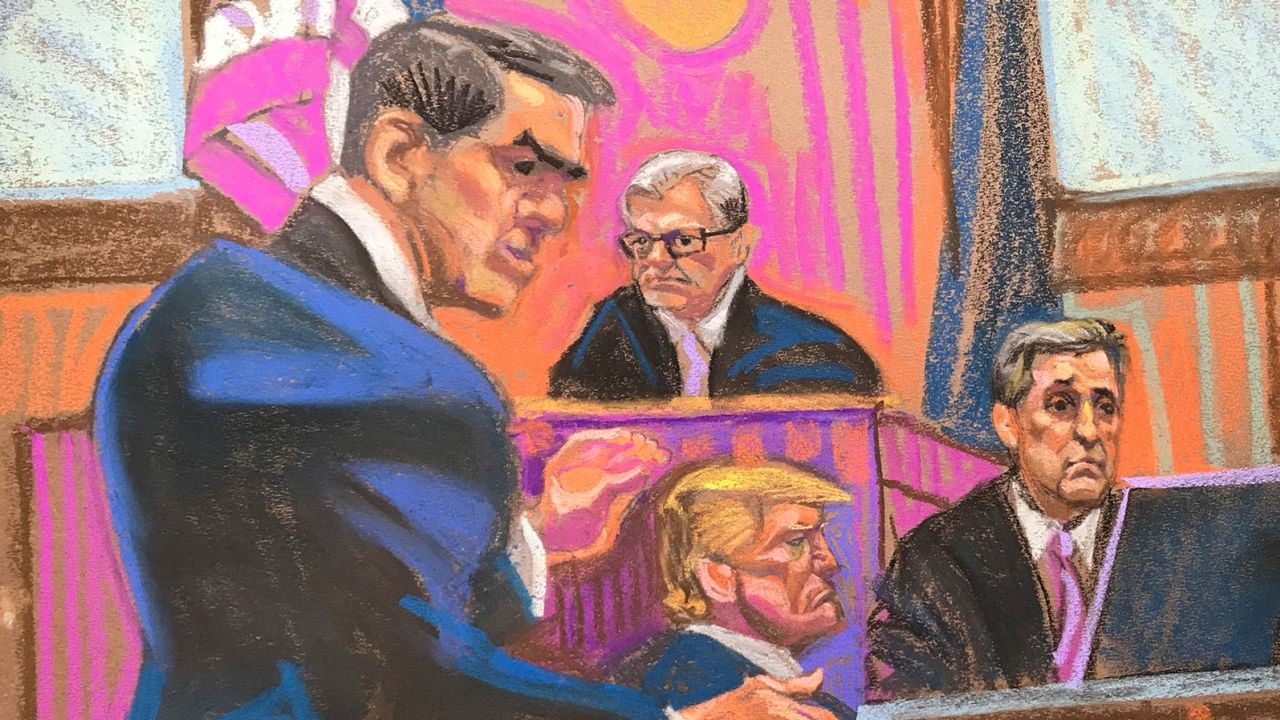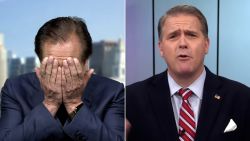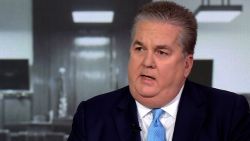Donald Trump attorney Todd Blanche raised his voice and flailed his arms at Michael Cohen, accusing the prosecution’s star witness of making up a phone conversation with Trump just before he sent $130,000 to Stormy Daniels’ attorney in October 2016.
Blanche confronted Cohen with text messages he sent with Keith Schiller – whom Cohen had said put Trump on the phone – which were unrelated to anything having to do with Trump or Daniels.
It was the most dramatic moment of the cross-examination of the key witness in the hush money case, and the clearest example yet of the defense’s effort to cast doubt on Cohen’s memory of phone calls and other significant interactions with Trump in 2016.
Court is off Friday so Trump can attend the high school graduation of his son, Barron. Cross-examination of Cohen will resume Monday and it’s possible summations could begin as soon as Tuesday.
Here are the takeaways from Day 18 of the Trump hush money trial:
A heated confrontation over a key phone call
It took several hours of cross-examination before Blanche finally turned to the evidence directly related to the case.
But it didn’t take long for Blanche to make his biggest rhetorical flourish – and perhaps his biggest blow to Cohen’s credibility – of the six-hour cross-cross examination so far, focusing on an October 24, 2016, phone call that Trump’s bodyguard placed to Cohen.
Under questioning from prosecutors on Monday, Cohen testified that he was reaching out to Schiller to speak to Trump that day because he needed “to discuss the Stormy Daniels matter and the resolution of it.”
But on Thursday, Blanche read Cohen a text that he sent to Schiller minutes before that call: “Who can I speak to regarding harassing calls to my cell and office the dope forgot to block his number.”
“Call me,” Blanche said Schiller responded.
Blanche says the texts show that at 8:04 p.m. Cohen texted Schiller the phone number of the teenager prank calling him.
Blanche used the texts to challenge Cohen’s account of the call. “That was a lie, you did not talk to President Trump, you talked to Keith Schiller – you can admit it,” he pressed.
Cohen calmly responded, “No sir, I don’t know that it’s accurate.”
Cohen said that part of the call was about the prank call, while adding, “I knew that Keith was with Mr. Trump at the time and there was more potentially than this.”
Blanche began pacing and waving his arms. His voice raised in volume and tone and he began talking quickly: “But now your memory is you were testifying truthfully on Tuesday. A 1 minute, 36 second phone call and you had enough time to update Schiller about all the problems you were having and also update President Trump about the status of Stormy Daniels’ situation because you had to keep him informed.”
“I always ran everything by the boss immediately, and in this case, it would have been saying everything had been taken care of, it’s been resolved,” Cohen responded.
Blanche continued to press on Cohen’s memory. “Was it true for just that phone calls, or was it true for other phone calls too?”
“You just said you don’t recall a phone call back in 2016. That is not what you testified to on Tuesday,” Blanche said, his voice crescendoing to a high-pitch just before the lunch break.
In the afternoon, Cohen defended his memory of his calls – arguing that while he’s had thousands of calls and did not remember all of the circumstances surrounding them, he did remember the details of important ones.
“Because these phone calls are things that I have been talking about for the last six years. They are and they were extremely important and they were all-consuming,” Cohen said. “So while I did not know that it took place at 8:02 p.m., what I did recall is the conversation that I had had.”
Cohen navigates years of inconsistent statements
Trump’s lawyer spent hours tediously moving through inconsistent statements that Cohen has made over the years to knock his credibility, although much of the content he was raising had little to do with the issues on trial.
Blanche questioned Cohen on myriad of topics, including the recanting of his 2018 guilty plea on tax charges, whether he wanted to work in the White House and what he’s said about a pardon from Trump.
Blanche hammered Cohen with repetitive questions about his 2018 guilty plea, which Cohen has since said was in part a lie under oath. Cohen said he’s taken accountability for the charges like tax fraud that he pleaded guilty to at the time, but he says he still blames others and was the victim of a corrupt prosecution.
“You blame a lot of people over the years for the conduct that you were convicted of?” Blanche asked.
“I blame people, yes,” Cohen responded.
Blanche also challenged Cohen on why federal and state prosecutors never took him on as a cooperator despite his guilty plea to campaign finance charges in connection to the alleged hush money scheme with Daniels.
Blanche suggested Cohen was unreliable and only acted like he’d taken accountability for the crimes when he pleaded guilty in order to get a reduced sentence.
Cohen pressed on desire for a pardon
Blanche also challenged Cohen on his desires to be in Trump’s White House, as revealed in private communications with his daughter and people like Pastor Darrell Scott, who Cohen asked to put in a good word with Trump.
Still, Cohen maintained on the stand Thursday that he only ever wanted to be Trump’s personal attorney – the position he held until he became the subject of a federal investigation.
Cohen also conceded on cross-examination that while he testified publicly to Congress that he never asked and would never accept a pardon from Trump, he actually did seek out a pardon from Trump through his attorney and later told lawmakers as much behind closed doors.
On the stand, Cohen admitted he explored a pardon with his lawyers because Trump “dangled” the idea of pardoning him and said he “wanted this nightmare to end.”
Cohen navigated the confrontation with a cool manner all day but largely told the jury to believe what he says now, not what he’s said in the past, including under oath.
Trump perks up for Cohen’s cross
For much of the week while Cohen has been on the witness stand, Trump has been taking in the trial with his eyes shut.
Trump hardly reacted to Cohen’s testimony during a day-and-a-half of prosecutors’ questions, and he even seemed disinterested during the first half of Blanche’s questioning of him.
Trump’s tuned-out body language has appeared to become part of his strategy this trial to not act out as he did previously during the New York civil fraud trial last fall and the E. Jean Carroll defamation case in January.
But Trump’s demeanor shifted on Thursday afternoon as the attention turned to Cohen and the media. He sat up in his chair facing directly toward Cohen as Blanche quizzed the witness about his conversations with New York Times reporter Maggie Haberman – who has come up previously in the trial in the form of a Trump tweet attacking her in 2018.
When Cohen told Blanche he has recorded roughly 40 conversations with reporters over the years, Trump turned to his attorney Susan Necheles and they both smirked at the response.
As for Cohen, he kept a calm demeanor throughout the testimony, choosing his words carefully and speaking slowly in his answers, even when Blanche’s pacing sped up considerably. Cohen frequently asked Blanche to repeat questions to him, particularly after an objection from prosecutor Susan Hoffinger was overruled by the judge.
The contrast of Cohen’s approach to his testimony was on display for the jury when Blanche played a recording of Cohen on his “Mea Culpa” podcast from May 30, 2023. The podcast Cohen spoke much more rapidly and with a hefty dose of excitement when discussing the indictment.
“I truly f**king hope that this man ends up in prison,” Cohen says on the podcast. “But revenge is a dish best served cold, and you better believe I want this man to go down and rot inside for what he did to my family.”
Trial nearing an end?
Before leaving for the weekend, Merchan told the lawyers to be prepared to give summations on Tuesday – meaning the jury could have the case as early as next week.
Prosecutors told Merchan they have no other witnesses to call after Cohen is off the stand, and the defense said it plans to call one campaign finance expert, though that is not set in stone.
Blanche said the defense could still choose to call additional witnesses to challenge testimony, and Trump’s team maintains it has not made a decision on whether the former president will testify in his own defense.
There’s also the possibility, as CNN has reported, that former Cohen attorney Bob Costello could appear. Costello made an impression during a House Judiciary subcommittee hearing Wednesday where he repeatedly attacked Cohen and said “virtually every statement” Cohen made on the stand about Costello was a lie.
The other complicating factor is there are only three days of court next week leading up to the Memorial Day holiday.
“It’s not ideal for there to be a big lapse” between summations and when the jury will be given final instructions by the judge before beginning deliberations, Merchan told the lawyers on Thursday.
Merchan didn’t say what that would mean for next week’s schedule – an early start or going later was one option, he suggested – but it all indicates that the judge believes the jury could end up beginning deliberations next week.























